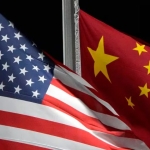
The Philippines is a Southeast Asian country with a population of about 110 million and a GDP of about 376 billion USD. The country is a former colony of Spain and the United States, and has a close and strategic alliance with the latter. The country is also a founding member of the Association of Southeast Asian Nations (ASEAN), and a claimant to parts of the South China Sea, where it has overlapping territorial disputes with China and other neighboring countries.
China is a East Asian country with a population of about 1.4 billion and a GDP of about 14.7 trillion USD. The country is a communist and authoritarian state, and a rising global power. The country is also a permanent member of the United Nations Security Council, and a rival and competitor of the United States. The country is also a claimant to almost the entire South China Sea, where it has built and militarized artificial islands and reefs, and where it has clashed and confronted other claimants, especially the Philippines.
China’s cyberattacks against the Philippines are a series of malicious and covert operations that aim to infiltrate, disrupt, and damage the computer systems and networks of the Philippine government, military, and private sector. The cyberattacks are carried out by hackers who are either directly or indirectly linked to the Chinese government and military, and who use sophisticated tools and techniques to evade detection and attribution.
Motives
China’s motives for launching cyberattacks against the Philippines are manifold and complex, but they can be summarized into three main categories:
- Strategic: China wants to assert and expand its influence and interests in the region, especially in the South China Sea, where it faces resistance and opposition from the Philippines and its allies, such as the United States and Japan. China wants to undermine and weaken the Philippines’ sovereignty and security, and to deter and dissuade it from pursuing its claims and rights in the disputed waters. China also wants to gain and exploit information and intelligence on the Philippines’ capabilities and intentions, and to expose and exploit its vulnerabilities and weaknesses.
- Economic: China wants to access and benefit from the resources and opportunities in the region, especially in the South China Sea, where it has invested and developed various projects and initiatives, such as the Belt and Road Initiative and the Maritime Silk Road. China wants to protect and advance its economic interests and advantages, and to prevent and counter any threats or challenges from the Philippines and its partners, such as the European Union and Australia. China also wants to steal and copy the technology and innovation of the Philippines and its allies, and to sabotage and disrupt their operations and activities.
- Political: China wants to project and maintain its image and reputation as a powerful and legitimate actor in the world, especially in the face of criticism and condemnation from the international community, such as the United Nations and the Human Rights Watch. China wants to defend and justify its actions and policies, and to influence and manipulate the opinions and perceptions of the public and the media. China also wants to create and exploit divisions and conflicts among the Philippines and its allies and neighbors, and to undermine and discredit their democracy and values.
Keep Reading
Consequences
China’s cyberattacks against the Philippines have serious and lasting consequences, not only for the bilateral relations between the two countries, but also for the regional and global stability and security. Some of the consequences are:
Negative consequences:
- China’s cyberattacks have caused significant and irreparable damage and losses to the Philippines, such as compromising its national defense and security, disrupting its critical infrastructure and services, stealing its sensitive and confidential data and information, and violating its sovereignty and dignity.
- China’s cyberattacks have also increased the tension and hostility between the two countries, and have escalated the risk and possibility of a military conflict or a diplomatic crisis, which could involve and affect other countries and actors in the region and beyond, such as the United States, ASEAN, and the United Nations.
- China’s cyberattacks have also eroded the trust and cooperation between the two countries, and have hampered the efforts and prospects for dialogue and diplomacy, such as the Code of Conduct in the South China Sea, the Bilateral Consultation Mechanism, and the Joint Oil and Gas Exploration Agreement.
Positive consequences:
- China’s cyberattacks have also raised the awareness and preparedness of the Philippines, and have prompted it to improve and strengthen its cyber defenses and capabilities, such as developing a national cybersecurity strategy and policy, establishing a cyber command and a cyber emergency response team, and enhancing its cyber education and training.
- China’s cyberattacks have also fostered the solidarity and partnership of the Philippines, and have encouraged it to seek and receive support and assistance from its allies and friends, such as the United States, Japan, Australia, and the European Union, who have offered and provided various forms of cyber cooperation and collaboration, such as sharing best practices, conducting joint exercises, and providing technical and financial aid.
- China’s cyberattacks have also stimulated the innovation and creativity of the Philippines, and have inspired it to pursue and achieve its own technological and digital development and transformation, such as launching its own satellites, developing its own applications and platforms, and promoting its own startups and entrepreneurs.


























